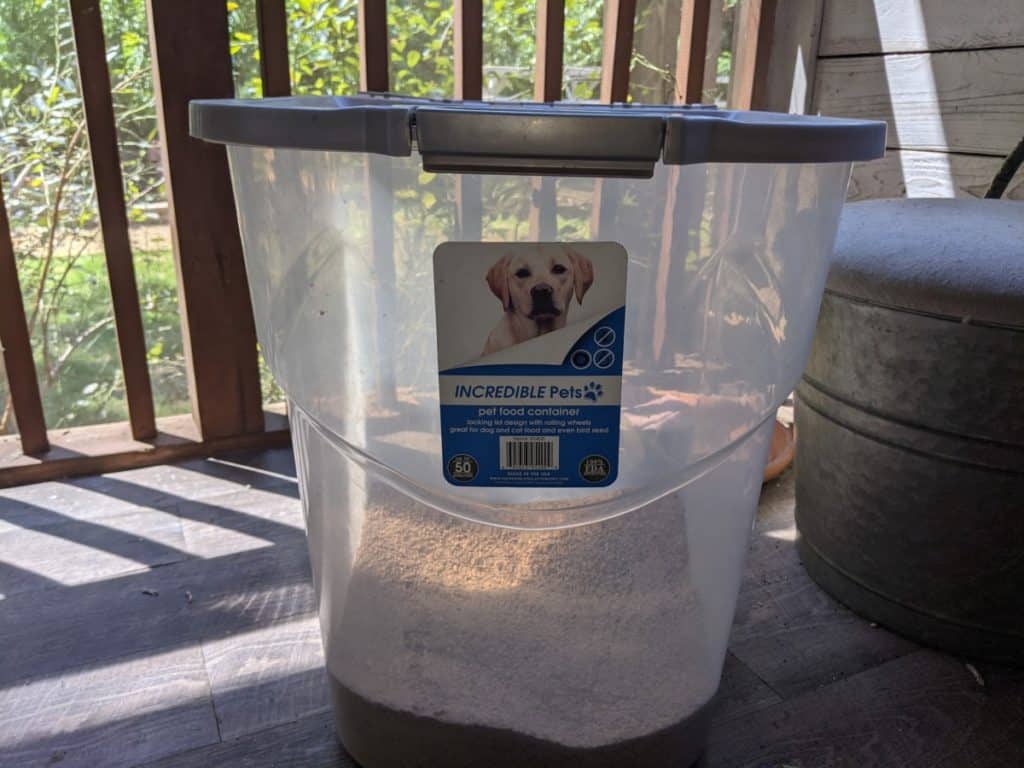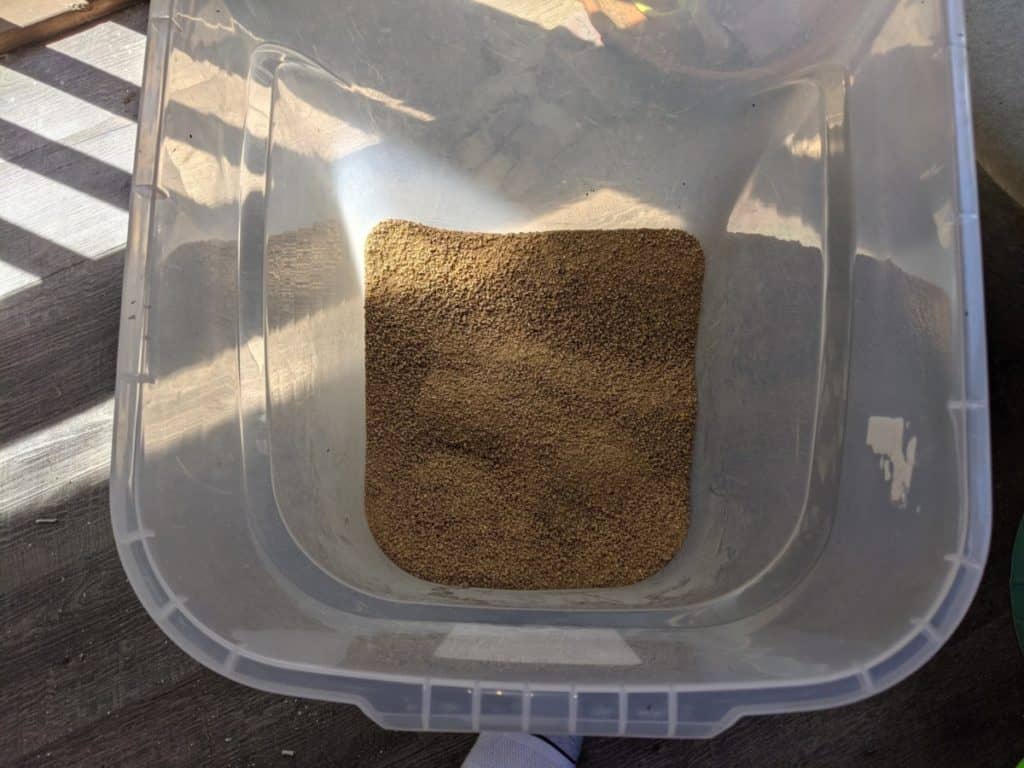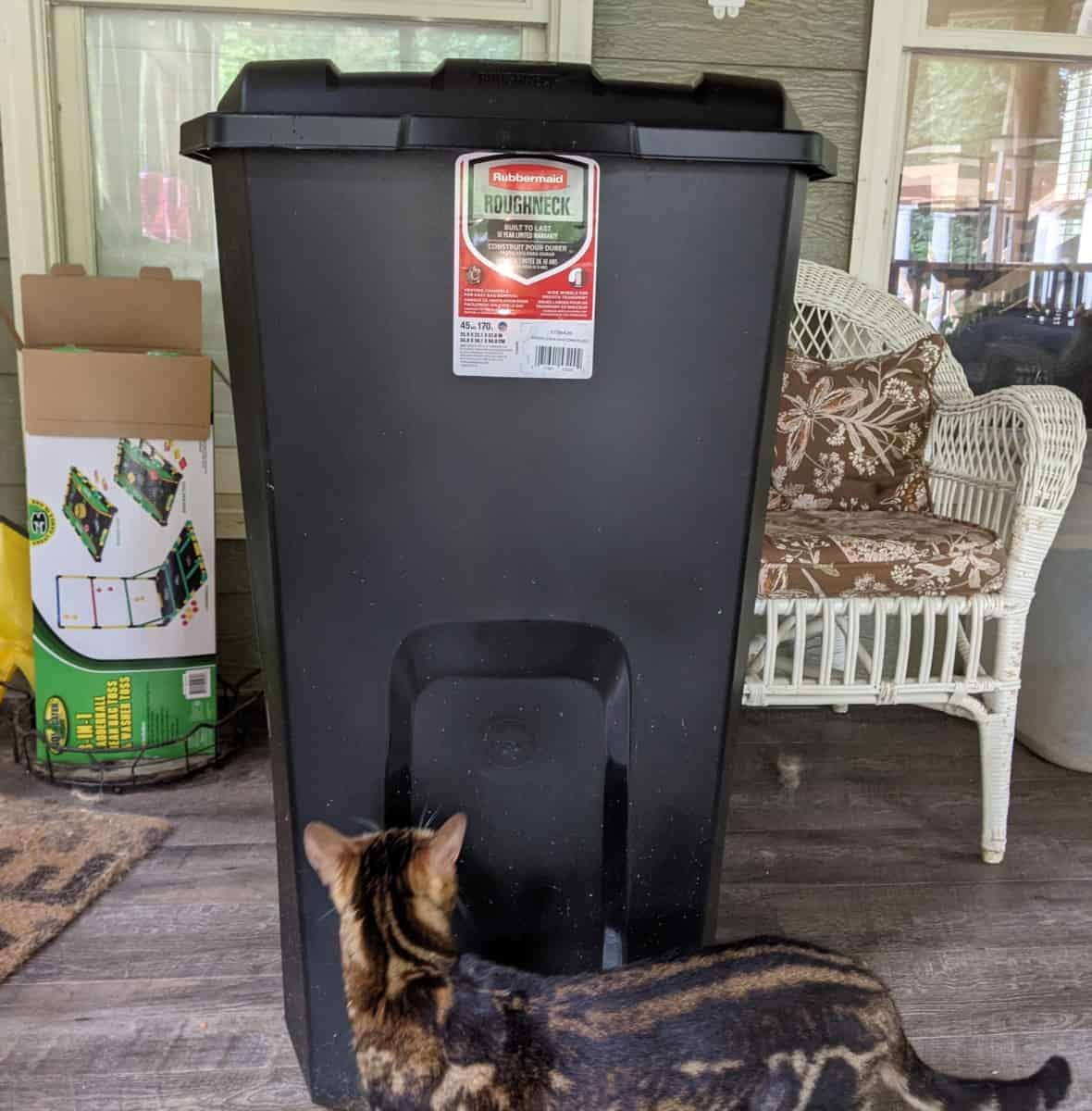We are usually far more concerned about the health of our chickens or our chicken coop designs.
Appropriate chicken feed storage is something that is often overlooked and not given much thought to. Unfortunately, if your chicken’s feed is stored incorrectly, your chicken feed can make your chickens sick; it can stop them from laying eggs, and in extreme cases, even kill them
Store chicken feed in a watertight, plastic, or food-grade steel container with a lid. Keep chicken feed out of direct sunlight and away from high humidity areas. Ensure that your chicken feed does not come in contact with harmful chemicals and that it’s protected from rodents and insects.
Proper chicken feed storage is essential, and it doesn’t take too much effort to do it right! In this article, the ins and outs of how to properly store chicken feed will be covered.
How NOT to Store Chicken Feed?
There are small not-to-do’s when storing chicken feed that will end up saving you a couple of bucks in the long run.
Let’s start with the top 5 NOT TO DO’S:
Do not store chicken feed in The Coop
It might be incredibly convenient to have your feed exactly where your chickens are, but storing chicken feed in the coop is a major no-no!
Your chickens could potentially peck into the bag, spilling everything, or they will likely poop over the bag and contaminate the feed. It also invites egg- and chicken-loving predators, like raccoons, right into the coop.
Do not use any old storage container
A simple plastic or wooden container may keep most of the moisture out of your chicken feed, but unfortunately, it doesn’t do as good of a job with pests.
Pests like rats, mice, raccoons, and squirrels are skilled at getting into drums of feed.
Invest in heavy-duty plastic containers or metal trashcans with tight-fitting lids. Whatever you don’t leave feed in the bag you purchased it in as these can be torn into easily by rodents and other animals.
Do Not Use Transparent Containers
Sunlight can quickly diminish the vitamins in your feed if kept in a transparent container. If you are using a plastic container, make sure that it’s a dark color.
If you do keep it in a clear container keep it in a dark place like I do where sunlight is absent or very limited.
Pay Attention to The Lids
Make sure that your lids can secure tightly over the container, or try to get a double-latched cover to prevent raccoons from getting into your feed. Rats also will get into your feed containers as well as cockroaches I have discovered.
Do Not Mix Old and New Feed
Ensure you separate your old and new supply feed from one another to prevent your newly bought chicken feed from being contaminated. The older feed may start to mold if you keep pouring new feed on top of the feed.

Where to Store Chicken Feed?
Formulated feed likes to being stored in a cool, dry, dark place. However, for those of us who don’t have a feed storage room, it’s best to keep your chicken feed in a watertight container that stays out of direct sunlight.
Drums, trash cans, and steel or plastic barrels are all excellent storage options for chicken feed.
Be cautious of non-food-grade steel containers. The chicken feed may react with steel containers, so if you are using a steel bin, it is advisable to keep the feeds in its bag instead of directly storing them in the steel container.
How To Store Chicken Feed
Picking the right location for storing chicken feed is vital if you want your feed protected and fresh. Here are the most important criteria to consider:
- Avoid direct sunlight
- Keep it dry- Protect your feed from rain.
- Have proper ventilation and dry, cool storage space.
- Keep your chicken feed dry by ensuring low humidity.
- Keep the chicken feed off the ground to prevent ground condensation and mold spoilage. Consider using a pallet instead.
- Use galvanized bins or thick plastic bins that will protect your chicken feed from rats, mice, and insect pests.
- Prevent contact with chemicals and drugs.
Moisture is the enemy! It is crucial to keep your chicken feed dry. Store your feed in a plastic or galvanized metal bin with a lid.

How Long Does Chicken Feed Stay Fresh?
It is possible to store feed for up to 4 months if it is kept in dry, moderate temperatures. In hotter summer months you want to use the feed within 60 days or less in most cases.
It’s essential to keep in mind that chicken feed doesn’t last forever, even when stored properly. Most chicken feed is pelleted before it’s bagged, which automatically increases the shelf life of your chicken feed.
In the winter months, you will find that your chicken feed will last much longer and stay fresher than the summer months when the heat and humidity can turn the feed much faster.
For the safest option to prevent mold and pests, I’d recommend trying storing no more than four weeks’ worth of food.
Can Chicken Feed Go Off?
Mixed chicken feed does not last forever. Chicken feeds contain fats that eventually oxidize, making your chicken feed turn rancid.
The rancid feed has an unpleasant odor and taste to it. Your chickens will avoid eating sour, rancid feed, and ultimately, their growth will be stunted. It is important to remember that fungi will hasten the process of chicken feed going off, making proper storage critical.
What Spoils Chicken Feed?
Most chicken feeds are relatively stable products, but a few common reasons may cause your feed to be lost or spoiled. Some of the most common reasons will be discussed below.
Humidity
The most common reason that feed gets wet is from rain or natural condensation that occurs in storage containers. Condensation will occur a lot faster if your bins are placed in direct sunlight.
Moisture is one of the biggest challenges of storing chicken feed. Humidity vastly speeds up fungi growth, which breaks down your feed and ultimately spoils it.
If you can’t keep your bins out of the sun, consider insulating your bins to keep them cooler and reduce moisture. Additionally, you can allow your containers to vent; this will let most of the moisture out. Make sure that your ventilation doesn’t allow rodents and bugs into your feed.
Rodent Damage
If your feed is stored or hanging out in the same bag you bought it in, mice, rats, and even raccoons will likely get into the food stores. They may chew into your bags or create a serious dent in your food storage if you give them enough time. Mice, rats, and raccoons also carry diseases that your birds can catch.
Insect Damage
Insects, such as moths, weevils, and beetles, can also diminish your feed stores, and they can be carriers of diseases. If those carriers get into your feed, you could be feeding your chickens disease-infested feed.
Roaches also love chicken feed I left my lid off one night and went to feed the chickens the next morning and the feed had turns of roaches eating the feed!
Fungal Damage
Mold in chicken feed is not uncommon; you may even find small chunks of moldy feed in your newly bought bag of feed. If you have small pieces of stale or moldy feed in your food stores, you don’t have to be concerned, but when your entire feed store is infected with fungi, you have an issue.
The fungus creates mycotoxins that give your feed an off-flavor and can ultimately poison your birds.
Keep Your Bin Clean
You will want to make sure to routinely clean your bins to prevent mites from contaminating your feed. Wash your bin with a safe detergent or soap and make sure the soap is properly rinsed out. Be sure to dry the bin properly before adding a new feed. As we said earlier- moisture leads to mold.
Conclusion
Poor storage will reduce the quality (nutrients and vitamins) and shelf-life of your chicken feed. In addition, factors including moisture, sun, and rodents can cause your feed to go rancid and are best avoided.
If you equip yourself with the suitable storage material and ensure that your feed is stored in the right environment, your feed will have a longer shelf-life.

